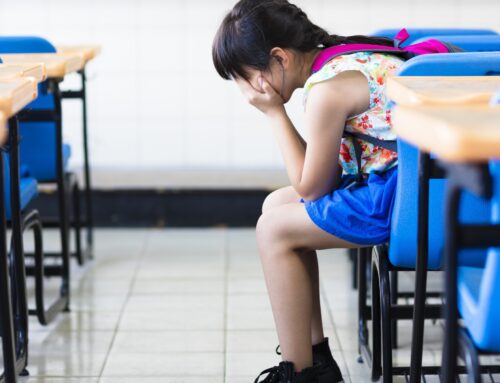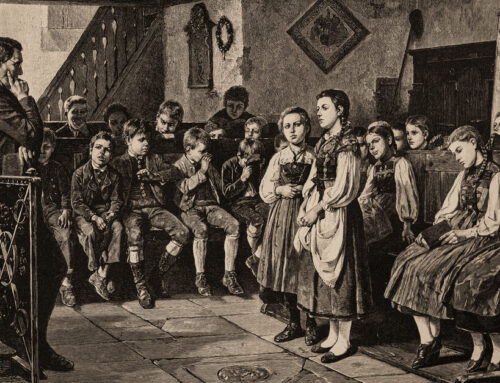
What is faith? What is morality? Are the two completely separate from each other, or are they dependent upon one another?
Kenyon Knapp, dean of the School of Behavioral Sciences at Liberty University and practicing counselor says, “Faith is that you believe in something and morality is the way you live it out.”
In that case, how do faith and morality look in American society today? What about in our schools? Is it possible to have moral training in our public institutions, or should we try to remove all religious influences from the classroom?
Joined by three highly qualified and distinguished professionals, NWEF president Melvin Adams conducted a Q&A panel last week to ask these questions and begin a national conversation about how to navigate religion in education.
There’s No Turning Back
If you take a steady look at America’s history, you’ll discover that Christian faith and a Christian-influenced moral system guided our founding principles from the beginning. That faith-and-morality structure has influenced all of our practices and laws to the point that it’s impossible to separate religion from our country’s fabric and history.
Thomas McCracken—a military veteran, teacher, and pastor—says, “You cannot cut and paste religion out [of education]. It’s who we are, it’s how we got where we are. So you would be doing every student a disservice by separating and compartmentalizing religion from education.”
In addition, removing the moral code from education is impossible—not only because it is so tightly woven into our history, but also because it is the fundamental basis for our legal system.
“Sometimes people will say, ‘You can’t legislate morality.’ But the thing is, all [our] laws are based on morality,” says Knapp. “The idea that we can divorce morality and law is absurd.”
America’s laws are based on a moral system because we desire to keep order and create a society where people can grow and flourish. If we want to maintain that environment and secure the future, we have to train the youngest citizens of America to respect their peers and have good personal character.
And the public school is where most children will learn what it means to be an American citizen—for better or worse.The standards that are taught and valued in public institutions will form the greater part of a child’s sense of right and wrong.
Brent Hudson, Chief Deputy Sheriff for Roanoke County, says, “I think there’s an expectation of behavior inside of school and so we have to have some sort of standard—and where does that standard come from?”
That is a critical question, often leading to controversy.
It’s a tricky road to navigate in modern America, where there is “a fear of the imposition of values,” as Knapp points out. “But I think there needs to be a fear of the opposite of that as well.”
The Religion of “Anti-Faith” and Self-Worship
That fear of imposing values upon others (or being “anti-faith”) can be traced to the philosophy of individualism—which is a current societal trend. Merriam-Webster defines individualism as “1. a doctrine that the interests of the individual are or ought to be ethically paramount [and] 2. a theory maintaining the political and economic independence of the individual and stressing individual initiative, action, and interests.”
Raw human nature that’s unchecked by moral standards will always tend toward chaos. With 20 years of experience in law enforcement, Hudson says, “People, a lot of times, do not want to own responsibility for their actions; they’ll justify their actions because of someone else’s actions or some circumstance that put them in this situation.”
Often, people living without a moral standard will operate on “what makes me feel good? What makes me happy? What do I want to do?…So I think because people are more self-centered, that they will go with whatever feels good at the time.” In essence, “you’re worshipping yourself,” Hudson concludes.
Life in America should be a careful balancing act of enjoying the freedom to practice whatever your faith may be, while simultaneously agreeing to live by national standards of behavior that uphold the common good of all.
As discussed earlier, we know where those standards originated. But now the question is where are we headed now?
The Necessity of Faith and Morality in Education
Liberty creates diversity. And America’s freedom of religion has invited many faith traditions to grow in our country—making its fabric more rich and complex.
Modern thought towards “religious education” is generally summed up like this: public schools shouldn’t teach any specific religion, but rather teach about all religions.
“Sounds risky. Why is that important?” you might wonder.
- It is a recognized standard of learning: McCracken points out that “standards of learning in Virginia require religion being taught….Every educator would agree that it is crucial to the success and achievement of every student to teach to the whole child.”
- Teaching to the whole child involves educating them on their past and the present so that they can navigate the future—and that includes religious education.
-
- Extracting religion from education would be dangerous because it would deny children the proper knowledge of their history. “Education and evangelism are two different things…You can’t understand the history of America unless you understand religion because that motivated the founders of the country in a huge way,” says Knapp.
-
- McCracken adds that it is critical for students to receive an education that informs them of the current “melting pot” of religions in America. “We’re doing our students a disservice in not teaching religion and culture….They get into the business world and they’re dealing with the diversity and something that’s very fundamental and important to 90-plus percent of our population. [If] we exclude [religion] from our schools, we’re setting our kids up for failure—even from a business perspective.”
So, the overall objective of education—to equip young citizens to succeed and to help maintain a strong society—can’t leave out religious education. Because “your belief systems most definitely impact your daily life and…the people around you,” says Knapp.
As religious diversity rises, students must be kept up-to-date in order to successfully navigate their world and live in peace with those around them.
Calling all Parents to Action
If you’re a parent reading this, perhaps you’re concerned about leaving it up to the school to educate your children about religion. Well, the good news is, you have another option. Be your child’s primary educator.
Now hold on…that doesn’t mean you’ve got to homeschool your kids. But it does mean that you—having the best interest of your child in mind—have the greatest opportunity to share your values with them and make the best decisions for them. You can enrich their lives by providing a positive learning environment at home and prioritizing quality interaction and training as a family.
If you choose to send your child to public school, you must be invested in their experience as a student and remember that you do have a say in their education.
Tom McCracken points out that in Virginia, “Code 1-240.1, [and I] paraphrase, a parent has a fundamental right to make decisions concerning the upbringing, the care, and the education of their children...We always have been the greatest stakeholders in a child’s education!”
This is historically true in America. McCracken continues: “In 1642 and 1647, the first two laws dealing with education in Massachusetts had to do with the parents’ responsibility as the primary stakeholder. That has not changed and it is still protected under Virginia code today.”
Find out what your state’s laws are regarding parental rights in education and exercise them! If you want to look further into ways that you can be your child’s primary educator, check out our resources at NWEF!
In summary
In the words of Sheriff Hudson: “Our society is divided. And I have to ask myself all the time: why are we not identifying as Americans? Why are we trying to break off into these little divisions everywhere instead of working together towards a common goal of educating our children and trying to ensure they have a great future?”
As Americans, where have we come from? Where are we now? Where are we headed?
And, most importantly, what is your part in all of this?
To follow more of this conversation on faith and morality in education, click here to watch the whole Q&A panel! Check out the list below to see what else the panelists covered in this informative interview!
Other topics covered in the panel:
- Separation of Church and State
- Which good values should be taught?
- Unanimous belief in the importance of morality across the major religions
- Can a public school be “religiously neutral”?
- Are political agendas attempting to “uproot” our values system?
- Should Bible reading and prayer happen in schools?
- How should character formation look at school?
- Should schools support parents’ values?
- Sending kids to school doesn’t “fix” them
- Education needs to advocate for all students—not just small percentages of student groups.
- Right becoming wrong and wrong becoming right
- Parent-teacher collaboration
- Letting kids make inappropriate decisions
- School choice and viable outcomes of education
- Education vouchers and money following the child
- Short term and long term impact of faith and morality upon society





[…] is a system of faith. Kenyon Knapp, dean of the School of Behavioral Sciences at Liberty University puts it this way, “Faith is that you believe in something and morality is the way you live it […]
[…] is a system of faith. Kenyon Knapp, dean of the School of Behavioral Sciences at Liberty University puts it this way, “Faith is that you believe in something and morality is the way you live it […]